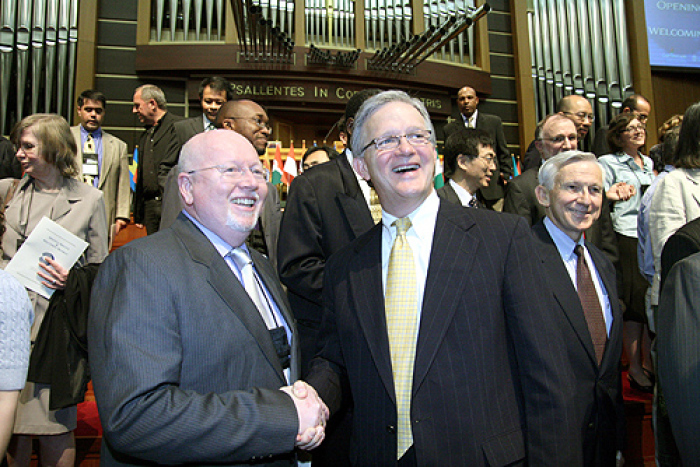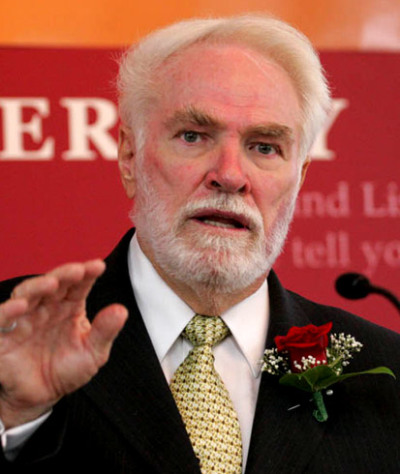How Do Religions Grow? Without a Vision, the People Perish (Part 8/8)

In my first article, I made the statement that many Christians are living in a fog concerning the growth of the worldwide Church. The meaning of the fog is that people cannot really see clearly the whole of Church growth.
All Christians rejoice when they are told that the our faith is growing, especially in the third world countries, but few have taken the time to study the growth of the larger Church and particularly its decline in the Western World. Many major denominations in the West are not happy that they have stopped growing, but they have offered up no real solutions to change the situation. One of the reasons that no one is looking at the total world scene is that they are too busy looking at their own private world that usually includes structures working at the micro and meta levels.

What is needed today is for someone or some agency, specialized in the development of strategy, to come forward with solid, well researched plans for the growth of the world church.
At one time I felt that we had three organizations that could fill this void: the World Council of Churches (WCC), the World Evangelical Alliance (WEA) and the Lausanne Movement. I call them "Cover" organizations since all three consider themselves to be worldwide movements.
As I began to look at the cover organizations, I was disappointed to discover that, in reality, none of the three were really committed to developing a practical global strategy that would help to reach the whole world for Christ.
My starting point was to try to understand the purposes of the three organizations. One advantage that I had was that I was not a novice in this area.
In talking with some leaders of the Lausanne Movement, I discovered that I was one of the very few who had attended all of its major meetings, including the first one in Berlin in 1966. I actively served on some of the committees that were interested in building better relations with the WCC.
I remember well one of the committee members stating, "This is ridiculous. We in the Lausanne Movement are writing letters to an equal committee at the WCC, and in reality, most of both committees are made up of the same people."
There has always been a desire for a closer working together, but one of the main stumbling blocks has been the understanding of "Evangelism" by the three different groups. Over the last fifty years, there has been some give and take in relationships between the three cover organizations in regards to working together.
The reason why none of the three cover organizations has developed a mega strategy to change the world has to do with the purposes of the organizations. Let us look at the expressed purpose of each group.
The World Evangelical Alliance
First let us take a look at the WEA. Their stated purpose is as follows: "Its purpose is to establish and strengthen regional and national Evangelical Alliances, who in turn enable the national churches so advance the Good News of Jesus Christ and effect personal and community transformation for the Glory of God."
The WEA is made up of local churches that have formed a national evangelical union. The WEA has as its base both churches as well as regional and national Unions. The leaders of this organization claim to represent over 600 million Christians. This figure is probably correct.
In their meetings, however, the leadership is generally more concerned with bringing the different National Unions together, something that is no simple matter. Their main emphasis is on fellowship, but it has been recently announced that they have three new areas of concern: the persecution of Christians, religiously motivated violence, and the resulting refugee crises.
There is little time left for strategy development, and strategy planning is not a high priority.
The World Council of Churches
The WCC is a fellowship of 348 member church denominations who together represent more than a half billion Christians around the world. Its basic makeup is also church and denomination based.
It defines itself as "a community of churches on the way to visible unity and one eucharistic fellowship expressed in worship and common life in church. It seeks to advance towards unity so that the World may believe."
Again their reason for not looking at the development of a Global strategy is that it is not a high priority for them. Unity of the Church seems to be their main purpose.
Historically, they have defined evangelism as social action and feel that their main goal is to help those in need. They see growth as the result of helping others. They should be commended for their excellent work in giving aid to the needy in the world. The membership of the WCC has remained somewhat static over the past half century.
The growth of WCC generally does not come from conversion growth through evangelistic efforts of their member churches but rather by biological growth (baptizing of church members' children) or by transfer growth.
The Lausanne Movement
At present, if there is one of the three that is involved in winning the world for Christ, it is the Lausanne Movement. They are the ones who see evangelism as bringing people to faith in Christ and bringing them into the fellowship of the church.
The reason this organization has failed to form a global outreach has to do with its base. The Lausanne Movement is different from the other two in that its base is made up more of para-church organizations and interested individuals than larger groupings of churches.
One statement from their movement states, "Lausanne has benefited from significant involvement from agencies and individual Christians."
True, many churches look to the Lausanne Movement for help, but it is difficult to get the large number of Christian mission organizations to agree practically on a common strategy.
In my many meetings with them, I have heard the right statements, but in talking with the individuals who attend their conferences, I have ascertained that they all see the need for Global evangelism, but each supporting organization wants its own smaller mission society to lead the way. It is difficult to get them to agree on a global strategy.
Conclusion
All three of the cover organizations have made great contributions to both the unity of the church and to the carrying out of its mission. I still feel, however, that many of their leaders have become so busy that they have failed to see the need for the creation of a mega strategy so as to reach many more for Christ.
Of the three cover organizations, the WEA possibly has the best opportunity of looking at strategy development on a global basis. The reason for this appraisal is that it is the only one of the three that has a good, strong concept of evangelism, and this understanding, coupled together with their strong church emphasis, places them in a favorable position.
Only time will tell if this movement or one of the others will see the need to spend some time and resources on the development of a global strategy.
Also see:
How Do Religions Grow? What Evangelicals Can Learn From Comparing Groups (Part 1/8)
How Do Religions Grow? Assemblies of God, Evangelism With Feeling (Part 2/8)
How Do Religions Grow? Jehovah's Witness, a Strict Taskmaster (Part 3/8)
How Do Religions Grow? The Gay Rights Movement's Mega Strategy (Part 4/8)
How Do Religions Grow? Islam's 4 Steps to Change the World (Part 5/8)
How Do Religions Grow? Mormons 'Hidden in Plain Sight' (Part 6/8)
How Do Religions Grow? Southern Baptists, Reversing the Decline (Part 7/8)




























